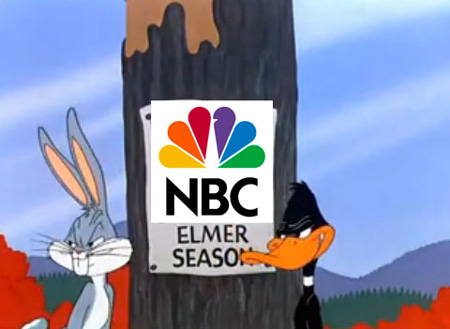
I was shaking the dust off the TVFTROU mailbag since it had been lying around for a while untouched and found a long neglected question sitting in there all lonely (for months it looks like, getting a bit yellow). It’s about time it got answered! Plus, it raises a good issue considering all the recent announcements from Netflix, Hulu, Amazon and others about their plans for original programming online.
I read an opinion article some time ago that said reality is the future of TV-as in, no scripted shows at all. Now I can understand how reality might take over from soaps, since they’re essentially the same thing but with real people (and slightly less utterly ludicrous storylines), but I’m not sure that reality could stand up to say, sitcoms and the hour-long scripted stuff. Thoughts? – PaintedWolf
TV as we know it is no doubt going through some big changes right now. The idea that networks would abandon scripted TV is a bit ridiculous, but I can see why some would think that. Given the popularity of mindless and cheap reality shows, I’m sure that point has been debated a lot. In big picture terms, it isn’t practical. Just looking at the current state of television shows why.
All of the five TV networks are all part of a vast corporate umbrella that includes their a profitable TV studio. NBC is tied to Universal Studios, ABC to Disney, CBS to CBS Television Studios (formerly Paramount TV), Fox to 20thCentury Fox, and even The CW to Warner Brothers/CBS Television Studios. Most of the network scripted schedules anymore are “in house” shows, aka shows produced by their sister studios. The corporate parent wins because they are assuring a way to get episodes made for future distribution plus they are raking in the advertising dollars to air and produce the show currently. This model has been the norm ever since 1993 when the Fin-Syn rules were abolished (For more info on that, go to https://www.tvfortherestofus.com/index.php?option=com_content&view=article&id=67;why-tv-networks-are-a-mess-part-one-the-history-of-tv-production&catid=54;general-television&Itemid=28).
Cable television started changing the landscape by producing their own original, high quality shows with budgets less than network TV. They offset costs most of the time by only making 13 episode seasons as opposed to 22. With less episodes, that meant they could make a series with 13 strong episodes as opposed to a network schedule of 22 episodes in varying degrees of quality (good, bad, indifferent). Judging by the fact that all Emmy nominated Dramas were cable shows last year, that says something about the cable model. They also didn’t have to stick to the traditional TV season schedule, and could air at off peak times where viewers are less distracted. Summer viewing has been the best time for these stations to gain traction, when networks usually go into repeats and reality. Cable has the timeslots available too to repeat these shows often, thus gaining a following by making the shows available to various times.
Compared to network shows, these high quality cable shows still don’t draw similar numbers of viewers, live anyway. For example, take AMC. That network isn’t on a lot of basic cable/satellite packages. Plus, AMC wasn’t exactly a “go to” network to begin with. When it started original programming like “Mad Men” and “Breaking Bad,” people weren’t watching. “Mad Men” in its first season drew an average of less than one million viewers. Since then, thanks to buzz, word of mouth, and gads of emmy nominations, people have been catching up with these series via DVD and Netflix. These shows are now gaining more viewers in their fifth seasons, something unheard of in the network model. Mad Men in the fifth season drew around 3.5 million viewers for it’s premiere. Dexter, in its seventh season, just hit a record number of viewers on Showtime. This is another Netflix “catching up” darling since Showtime only has around 18 million subscribers. If any of those shows were on network TV, they would have been cancelled due to low ratings in their first season, not to mention heavily censored and watered down.
3.5 million by network standards is still not a lot of viewers. That’s the thing, that’s only viewers that tuned in to watch the day the episode aired. Cable viewers are not usually into appointment television, plus a lot of people still don’t have AMC (DISH subscribers know this problem well) and still plan on knocking out a whole season through viewings on Netflix. Considering AMC gets a license fee to stream “Mad Men” on Netflix, they are now earning money that way. AMC also gets cable subscription revenue so they can afford to keep producing these shows.
Networks can’t take risks like this. They don’t get subscription revenue. They rely solely on advertising dollars, so number of viewers in one sitting matters greatly. They need to produce programs that will do just that, cater to the masses. Or at least the 18-49 masses. Serial shows don’t attract masses, so networks have been opting the for the lesser quality standalones and cop procedurals. They’re easier to take in one viewing. Cop procedurals strangely do very well in second run on, wait for it, cable stations. The very same cable stations that are also trying to attract you to their stations for original programming. They do so by airing repeats of popular network shows. It’s quite a vicious cycle, isn’t it?
What’s been happening is because the big networks are using their big sister studios to produce shows, the independent producer, once the king of TV production in the 70’s and 80’s (Aaron Spelling anyone?) has been shut out of the creative process. They’ve had to seek deals where they work with the network studios to create the show, going by the network’s terms, but don’t have a lot of creative control and lose a lot of the massive distribution revenue that comes with syndication.
Cable became a place for these producers to sell creative ideas that would cater to a niche. The Walking Dead, the most watched drama this year in 18-49, cable or network, was originally pitched to NBC. They passed, so it was dealt to AMC. But even cable stations are limited by slots and budget (as producers of The Walking Dead found out). Now there’s a new medium exploding for independent producers to share their vision, online. The opportunities are bigger than ever. Netflix, Amazon, and Hulu have all announced big budgets and intentions to create original programming. They see what happened to cable. By doing original programming, that will get people to flock to their service and check out their other offerings as well. In Netflix’s case, it’s streaming whole catalogs of older and current network and cable shows. It’s essentially the current cable model being pushed to a new place.
The biggest problem with online is there is no immediate revenue. Netflix and Hulu do charge subscription fees for their service, and there is some advertising, but it’s not big money like what the broadcast networks get from advertisers. There was an excellent article recently in the NJ Star Ledger about how online is changing the way we watch television. In that article, they got a quote from the chief content officer at Netflix, Ted Sarandos, that best reflects the online mentality for producing shows. “I’m looking at the value of attracting a very large audience over a very long time as opposed to a very large audience all at once.” That’s the anti-network mentality, but it certainly will guarantee a more steady revenue stream, won’t it? The new way requires patience, which is unheard of in network television.
So, let’s go back to the original question. Will networks end up producing all reality? No. They are going to have to continue to offer live viewing attractions, like NFL games and shows like “The Voice,” “American Idol,” and “Dancing With The Stars” to bring in those big advertising dollars and lots of viewers. The rest of the time will be there for their studios, because there’s still slots on cable stations and online to sell content at a premium and those opportunities are growing.
I see networks having to become more patient with scripted shows out of necessity and heavily consider DVR and online popularity when measuring a show’s success, not just advertising revenue potential. They need to build brands that can be distributed elsewhere long term. The CW is doing a lot of that now, but they’ve had to. It’s the only way their original intent of the network, which is creating smaller shows so their studios to market internationally and online for quick and long term profit, can happen. The network is often chastised for it’s lower ratings and inability to compete with the larger networks but truth be told, their shows thanks to international distribution and deals with Netflix and Hulu are making money right as the first episode is produced and beyond. These shows tend to stay popular for a while and contribute to that long term viewing that studios crave.
The CW network doesn’t make money, but the corporate parent and sister studio do, so it’s a win for the whole entity – in theory anyway. I’m not sure how much of that revenue is trickling back to the network in reward for their sacrifice. This is the way it’s going to be for TV networks from now on though, so The CW is actually becoming a pioneer in this new landscape. Netflix is becoming a pioneer in their little niche of online programming. The two will be able to co-exist and build on one another. When it’s all said and done, the big winner will be the viewers.
Got any other questions for our mailbag? I’m game for anything TV related! Just post your question in the comments, or send it through Contact Us.





Hi Alice, thanks for answering my question. I’d almost forgotten I’d put in there! I’m always very interested in all the behind the scenes stuff, especially how it all works over there in the States, since the majority of programming we get locally is stuff brought in from there. I’ll be sure to post again when I have something else!
Hi Alice, thanks for answering my question. I’d almost forgotten I’d put in there! I’m always very interested in all the behind the scenes stuff, especially how it all works over there in the States, since the majority of programming we get locally is stuff brought in from there. I’ll be sure to post again when I have something else!